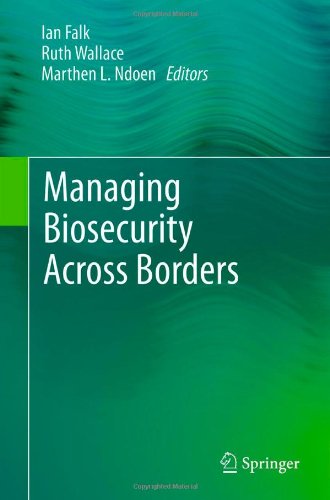

Most ebook files are in PDF format, so you can easily read them using various software such as Foxit Reader or directly on the Google Chrome browser.
Some ebook files are released by publishers in other formats such as .awz, .mobi, .epub, .fb2, etc. You may need to install specific software to read these formats on mobile/PC, such as Calibre.
Please read the tutorial at this link: https://ebookbell.com/faq
We offer FREE conversion to the popular formats you request; however, this may take some time. Therefore, right after payment, please email us, and we will try to provide the service as quickly as possible.
For some exceptional file formats or broken links (if any), please refrain from opening any disputes. Instead, email us first, and we will try to assist within a maximum of 6 hours.
EbookBell Team

4.1
80 reviewsThis book works towards a strategy for managing plant biosecurity in complex contexts. Managing the risks that pests and diseases pose to plants of all kinds is a highly complex issue, made more so in an era where climate change is facing us on a daily basis. Borders between nations, regions and culturally distinct and diverse peoples provide the background for the multi-disciplinary but integrated research presented in this book. The policy, power-plays and vested interests of people from all sectors and tiers of society coming to grips with basic issues of securing their food supplies and cultural heritage provide the foreground in a drama that affects the lives of millions. To achieve change in such a context requires a strong evidence-base from science and social science, and this book makes the first, and a comprehensive contribution to this end.
“Just to the north of Australia lie the islands of Wallacea, one of the world’s great biogeographical frontier zones. In this fascinating book, a multi-disciplinary team of Australian and Indonesian researchers reflect on the challenge of managing invasive species, pathogens and other threats across borders both geographic and disciplinary. Frontier zones often bring forth exciting innovations, and the authors have risen to the challenge with broad and incisive analyses ranging from plant pathology to gender, community empowerment and cross-cultural understanding. The whole is much greater than the sum of the parts, thanks to the commitment of the authors of case studies to engage in ongoing meta-analyses of the big questions that emerge at the borders of their disciplines.”
J. Stephen Lansing
Professor of Anthropology, Ecology and Evolutionary Biology, University of Arizona
Senior Research Fellow, Stockholm Resilience Centre
Professor, Santa Fe Institute, USA
“Just to the north of Australia lie the islands of Wallacea, one of the world’s great biogeographical frontier zones. In this fascinating book, a multi-disciplinary team of Australian and Indonesian researchers reflect on the challenge of managing invasive species, pathogens and other threats across borders both geographic and disciplinary. Frontier zones often bring forth exciting innovations, and the authors have risen to the challenge with broad and incisive analyses ranging from plant pathology to gender, community empowerment and cross-cultural understanding. The whole is much greater than the sum of the parts, thanks to the commitment of the authors of case studies to engage in ongoing meta-analyses of the big questions that emerge at the borders of their disciplines.”
J. Stephen Lansing
Professor of Anthropology, Ecology and Evolutionary Biology, University of Arizona
Senior Research Fellow, Stockholm Resilience Centre
Professor, Santa Fe Institute, USA
“Just to the north of Australia lie the islands of Wallacea, one of the world’s great biogeographical frontier zones. In this fascinating book, a multi-disciplinary team of Australian and Indonesian researchers reflect on the challenge of managing invasive species, pathogens and other threats across borders both geographic and disciplinary. Frontier zones often bring forth exciting innovations, and the authors have risen to the challenge with broad and incisive analyses ranging from plant pathology to gender, community empowerment and cross-cultural understanding. The whole is much greater than the sum of the parts, thanks to the commitment of the authors of case studies to engage in ongoing meta-analyses of the big questions that emerge at the borders of their disciplines.”
J. Stephen Lansing
Professor of Anthropology, Ecology and Evolutionary Biology, University of Arizona
Senior Research Fellow, Stockholm Resilience Centre
Professor, Santa Fe Institute, USA